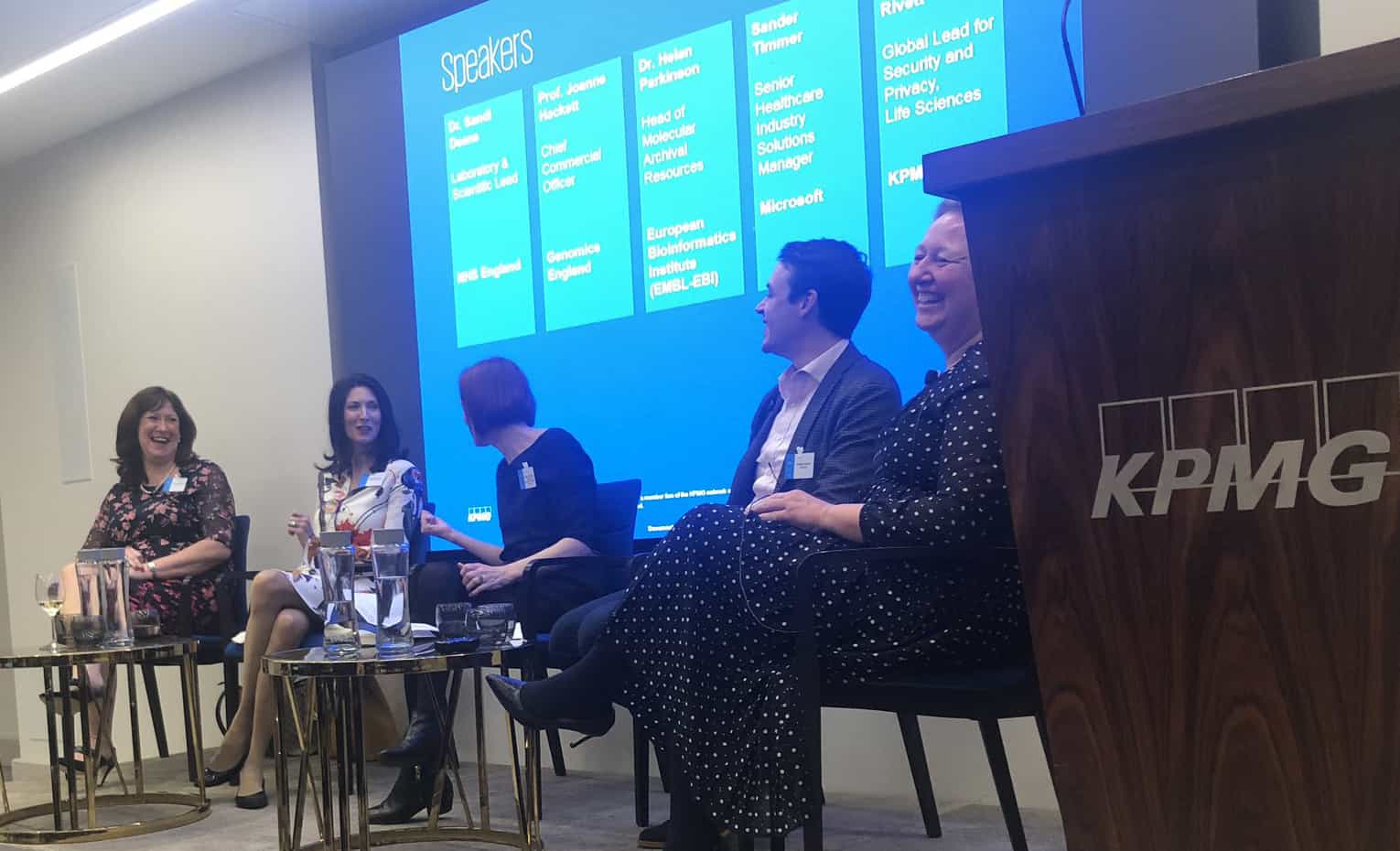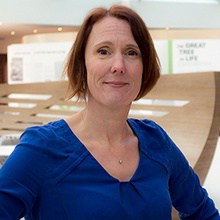The entire genomics platform could prove to be an integral part of the UK’s healthcare system, if the country can integrate it as a mainstream service.
With its potential in drug development, personalised medicine and transforming patient outcomes, the study of the human genome could address some of life sciences’ biggest challenges, including rising healthcare costs.
In January, the Healthcare Businesswomen’s Association (HBA) invited experts working in healthcare and big data to bring to light the benefits and drawbacks of genomics.

One of the speakers on the panel was Joanne Hackett, Chief Commercial Officer of Genomics England, who has been involved in the 100,000 Genomes Project, led by Genomics England, to make the country a leader in genomic medicine.
In partnership with the NHS, Genomics England set out to sequence 100,000 genomes of those with certain types of cancer and rare diseases.
Sequencing involves identifying the order of DNA nucleotides in the genome, which is made up of three billion letters (all a mixture of As, Cs, Gs and Ts).
Around 20,000 of those letters are gene- associated and come in different variants. Most of these variants are harmless, but some could unlock the answer to diagnosing, and subsequently treating, those with rare diseases and cancer.
“The whole point of this was to see whether whole genome sequencing of a population at scale would benefit both the UK economy and the patients that partook in the programme,” said Hackett.
“With the project, we identified a range of benefits when integrating genomics within the NHS. Not only do we have a strong economics case, but genomics allowed for faster diagnosis and more accurate treatments.”

Joanne Hackett, Chief Commercial Officer, Genomics England
Last December, NHS England announced that Genomics England had sequenced its 100,000th genome, but no sooner had this target been reached than health secretary Matt Hancock announced a new goal.
This time, it hopes to sequence five million genomes within the next five years.
Upping the number of samples sequenced provides a range of benefits such as identifying which patients will better respond to specific treatments. This will result in the acceleration of drug development.
It has a way to go before these benefits come to fruition, but the NHS’ long-term plan includes a strategy that will weave genomics throughout mainstream medicine services.
Sandi Deans, a molecular geneticist, who has worked closely with the 100,000 Genomes Project said: “We were incredibly pleased to see genomic medicine embedded throughout the whole of the plan.
“The main aim is to implement a genomic infrastructure for early detection of disease. We can then make sure personalised medicine treatment is targeted to the individual so they get the best treatment at the right point in time. We want to ensure that every patient has the opportunity to have a genomic test if deemed appropriate by their clinician.”
Last year, NHS England announced that it will focus on earlier diagnosis and more personalised medicines for cancer and rare disease patients, and it will further that goal by launching a mainstream genomics service under the NHS.
“The Genomics Medicine Service will be rolled out slowly over the next six months or so, and this is effectively why the 100,000 Genomes Project was set up. Ultimately, it aims to deliver routine clinical care for those with inherited rare diseases, as well as certain forms of cancer,” explained Hackett.
“In the future, those patients will have a whole genome sequence done first, as opposed to having many different diagnostic journeys that one needs to take in order for a diagnosis.”
A giant leap forward in technology is allowing for this type of service to become a reality. When the first human genome was sequenced it took 13 years and £2bn to come to completion. Today, the cost of the raw sequencing can be done for as little as $1,000. With the advances in next generation sequencing technologies, and increasingly powerful bioinformatics, it is possible to return a diagnosis in 24 hours.
While the underpinning technology of clinical whole genome sequencing continues to show much promise, it is bringing to light wider challenges present in today’s healthcare environment.
“The big test isn’t just about rolling genomics into mainstream healthcare, it’s about sharing the data with industry,” said Deans. “The data has to be managed very carefully, with the benefits and limitations made easy to understand for patients. Data in rare diseases is incredibly powerful.”

Sandi Deans, Consultant Clinical Scientist, GenQA/UK NEQAS
Data gathered by genomics adds to the recent explosion in available health data, which is enabled by products such as wearables and its accompanying apps that provide an almost instantaneous healthcare analysis.
That data is allowing consumers to take control of their own health, and panellist Sander Timmer, Senior healthcare industry solutions manager, Data & AI at Microsoft, predicts that in the next twenty years “individuals will own more of their own encrypted health data, including data copies of their genomic profiles”. However, sharing this data now is a difficult legislation to navigate.
“There are some very negative connotations about industry grabbing data and doing horrible things with it,” said Hackett.
“I used to work in industry, and all they want to do is treat people, but we need to allow industry to see what’s happening on the inside for them to create better drugs.”
Data from the 100,000 Genomes Project is uploaded into an online archive, which can be accessed globally. Hackett ensures that access to such sensitive nature is very tightly controlled.
A series of identification checks are obligatory in order to access data, which include an access review committee that manually checks submitted project registrations. Data privacy officers also play an important role in this process, ensuring data integrity and building public trust.
“The checks are labour intensive, but if I were a patient I would want to know that someone is going over and above the call of duty to protect that data,” said Hackett.
Around 3,000 academics across the world have access to the data, and out of the hundreds of companies that Genomics England works with, only nine have access. Hackett explains that the companies might not necessarily want the burden of having to log in to the system.
“There are different ways in which we can manage the data, but at the same time progress the science, which is the most important thing to us,” she added.
Sharing data during the 100,000 Genomes Project was embedded into the programme’s terms, but it might not be as simple when it comes to the roll-out of the service.
Deans explained: “There are different ways to gather consent. A rare disease patient will be very much aware of what’s going on, they would know their disease inside out. That permission conversation will be much different to a newly diagnosed cancer patient for example, who has suddenly received the most traumatic news of their life, and now they’re being bombarded with questions relating to research participation and data sharing. But it’s about pitching.”
Helen Parkinson (pictured below), head of molecular archival resources at the European Bioinformatics Institute, was also on the panel.

She said: “Consent is a specialist activity. If consenting is done well and carried out by experts then it can make for a meaningful dialogue, but if it’s done in a cursory way in a clinical setting then it can be problematic.”
However, Health Education England has set up a genomics education programme, to increase the skills of the existing healthcare workforce to enable them to respond to the changing genomics landscape.
The UK government is also preparing for the integration after it launched a nationwide genomics healthcare strategy, which sets out how the genomics community, including pharma, healthcare and data companies, can work in tandem to offer a personalised healthcare service underpinned by genomics.
Undoubtedly, this would mean implementing an effective IT infrastructure along with striking a balance between strict data governance to protect patients’ data and allowing for the continuation of vital research.
Hackett concluded: “We have to overcome these challenges by working together. Genomics has to be collaborative, and that’s what I love about it. No one can do the work on their own and that’s the exciting part.”




